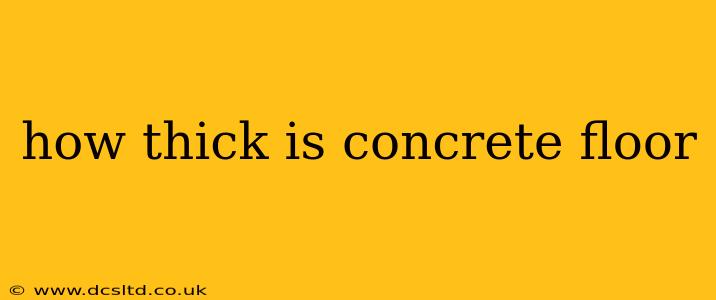Planning a concrete floor? Knowing the right thickness is crucial for its strength, durability, and longevity. This isn't a one-size-fits-all answer; the ideal thickness depends on several factors. This guide explores these factors and helps you determine the appropriate thickness for your specific project.
What Factors Determine Concrete Floor Thickness?
Several key factors influence the required thickness of a concrete floor:
-
Intended Use: A residential garage floor will have different requirements than a heavy-duty industrial warehouse floor. High-traffic areas need thicker slabs to withstand the wear and tear.
-
Subbase Quality: A well-compacted subbase provides excellent support, allowing for a thinner concrete slab. Conversely, a poor subbase necessitates a thicker slab to compensate for instability.
-
Soil Conditions: Expansive clay soils can exert significant pressure on the concrete, requiring a thicker slab to prevent cracking. Well-drained soils present fewer challenges.
-
Load-Bearing Requirements: Heavier loads, like machinery in a factory or parked vehicles in a garage, demand a thicker, stronger concrete slab.
-
Climate: Extreme temperature fluctuations can cause expansion and contraction in concrete. Thicker slabs are more resistant to cracking caused by these changes.
-
Reinforcement: Adding steel reinforcement (rebar) significantly increases the strength of the concrete slab, potentially allowing for a thinner slab while maintaining the necessary load-bearing capacity.
How Thick Are Typical Concrete Floors?
While there's no single "standard" thickness, here are typical ranges for different applications:
-
Residential Slabs (Patios, Driveways): 4-6 inches are common. Thinner slabs might suffice for lighter traffic areas, while thicker slabs provide more durability and crack resistance.
-
Residential Floors (Garages, Basements): 4-6 inches is generally sufficient, especially with proper subbase preparation. However, heavier equipment or vehicles might necessitate a thicker slab.
-
Commercial/Industrial Floors: These floors often range from 6 to 12 inches or more, depending on the anticipated loads and traffic. Heavy machinery requires significantly thicker slabs.
What About Concrete Floor Thickness for Different Purposes?
Let's delve deeper into specific applications:
H2: How thick should a concrete basement floor be?
A typical basement floor in a residential setting usually needs to be between 4 and 6 inches thick. However, if the basement will be used for heavy storage or workshops, increasing the thickness to 6 inches or more is recommended for better load-bearing capacity. Proper subbase preparation remains crucial.
H2: What is the minimum thickness for a concrete patio?
While a thinner concrete patio might seem economical, aiming for at least 4 inches is advised. This ensures sufficient strength and crack resistance to withstand typical foot traffic and weather conditions. A thicker slab (up to 6 inches) will increase durability.
H2: How thick should a concrete driveway be?
A typical residential driveway should be at least 4 inches thick. However, heavier vehicles or frequent use might necessitate a thicker slab (5-6 inches). Consider adding a wire mesh reinforcement for increased durability.
H2: What is the minimum thickness for a concrete garage floor?
A 4-6 inch thick concrete garage floor is generally sufficient for residential use, assuming proper subbase compaction. However, if you plan to park heavy vehicles or use the garage for workshops, opt for a thicker slab (6 inches or more) to withstand heavier loads and prevent cracking.
Seeking Professional Advice
Remember, these are general guidelines. The optimal concrete floor thickness depends heavily on the specific project's requirements. It's always best to consult a qualified structural engineer or concrete contractor to determine the precise thickness needed for your unique situation. They can assess the site conditions, intended use, and loads to provide accurate recommendations that ensure a durable, long-lasting floor. This consultation will ultimately save you money and headaches in the long run.
